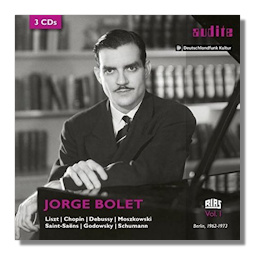
The Internet's Premier Classical Music Source
Related Links
-
Debussy Reviews
Chopin Reviews
Saint-Saëns Reviews
Schumann Reviews
Moszkowski Reviews - Latest Reviews
- More Reviews
-
By Composer
-
Collections
DVD & Blu-ray
Books
Concert Reviews
Articles/Interviews
Software
Audio
Search Amazon
Recommended Links
Site News
 CD Review
CD Review
The RIAS Recordings Volume 1

Berlin (1962-1973)
- Franz Liszt:
- Années de pèlerinage, 1ère année "Suisse", S. 160 (e1-VI)
- Études d'exécution transcendante, S. 139 (1, 2, 8, 9, 11, 12)
- Études d'exécution transcendante, S. 139, Nocturnes 1-3
- Rhapsodie espagnole "Folies d'Espagne", S254/R90
- Moritz Moszkowski: En automne, Op. 36/4
- Camille Saint-Saëns: Le Cygne (The Swan)
- Robert Schumann: Liebeslied (Widmung, Op. 25/1) arr. Liszt
- Leopold Godowsky: Le Salon
- Frédéric Chopin:
- Fantasy in F minor, Op. 49
- Impromptu #1 in A Flat Major, Op. 29
- Impromptu #2 in F Sharp Major, Op. 36
- Impromptu #3 in G Flat Major, Op. 51
- Fantasy-Impromptu in C Sharp minor, Op. 66
- Claude Debussy:
- Préludes (Premier Livre I, IX, X, XII)
- Préludes (Deuxième Livre VI, VCII, VIII, XII)
Jorge Bolet, piano
Audite 21.438 3CDs
Also available Audite 97.738 Vol. 2 (1971-1982): Amazon - UK - Germany - Canada - France - Japan
The Cuban-born pianist Jorge Bolet was a famously late-blossomer, at least as far as fame and fortune are concerned. He sprang into the limelight at the age of 60, after a celebrated recital at Carnegie Hall in 1974, a mere 37 years after his first recital in 1937. In 1978 he was signed to an exclusive contract by Decca, the source of most of the studio recordings we have of his playing. The performances on this fine 3-disc set from Audite all pre-date his rise. They are taken from original tapes in the archives of RIAS (the Rundfunk im amerikanischen Sektor , which was a radio and television station broadcasting in the American sector of Berlin during the Cold War).
As is usual with releases from Audite, the general production values are first rate. The nicely produced box includes a long essay by Wolfgang Rathert and full recording details. The sound quality is also very good, and certainly good enough to appeal beyond historical recording enthusiasts.
As a pianist, Bolet elicited strong reactions. Hailed as the last great Romantic pianist by some, he was derided as an empty virtuouso by others. It's certainly true that he gravitated towards the virtuoso end of the repertoire. This collection contains, for example, one of the Godowsky transcriptions of Chopin's Etudes, famed for their difficulty. And the second disc ends with a suitably pyrotechnic rendition of Debussy's "Feux d'artifice".
The first disc, though, clearly gives the lie to the idea that Bolet had nothing to contribute but his prodigious technique. The six pieces from Liszt's Années de Pélerinage are played with an emotional range often missing in recordings of Liszt's solo piano works. I am not much of a Liszt enthusiast at the best of times, but Bolet makes a powerful case for the Études d'exécution transcendante in the six pieces that he plays.
On the other hand, I suspect that many will find his approach to Chopin and Debussy too heavy. He is a master of technique and color, but there is not much of the dance in his Chopin or impressionistic shimmering in his Debussy. Of course, for others these would be advantages.
Bolet was a highly distinctive pianist voice and this collection is an important addition to his discography. The pieces on Disc 2 by Moszowski, Saint-Saens, and Godowsky will be a distraction for some, and a delight to others. But the appeal of this collection surely lies in more mainstream regions of the repertoire. This is a must-buy for Lisztians and deserves serious attention from Chopin and Debussy enthusiasts.
Copyright © 2018, José Luis Bermúdez


















